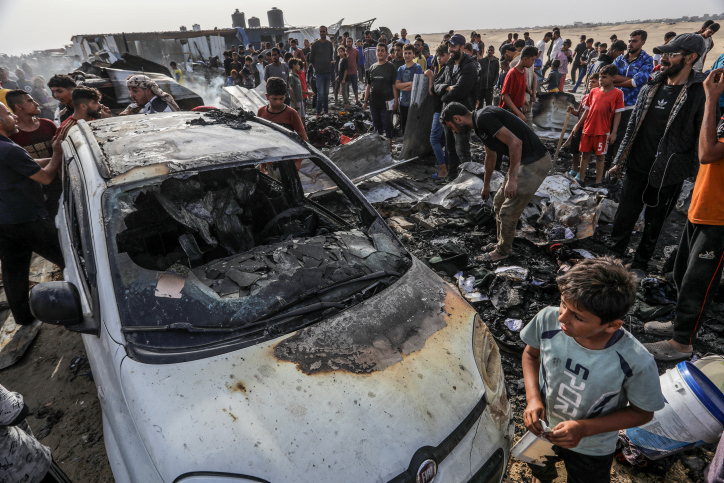If the international community wants to see new faces in the Palestinian leadership, it must exert pressure on Abbas and the ‘old guard’ leadership to stop targeting young political activists, journalists, and human rights defenders.
By Bassam Tawil, Gatestone Institute
Palestinian leaders have a long history of cracking down on their political rivals and opponents.
For the past three decades, leaders of the Palestinian Authority (PA) and Hamas have systematically targeted political activists, journalists, social media users, students, professors and human rights activists as part of an ongoing campaign to silence critics and deter others from speaking out against the lack of democracy and freedom of speech.
In 2017, Magdalena Mughrabi, Deputy Middle East and North Africa Director at Amnesty International, warned that “the last few months have seen a sharp escalation in attacks on journalists and the media by the Palestinian authorities in the West Bank and Hamas in Gaza in a bid to silence dissent.”
She added: “This is a chilling setback for freedom of expression in Palestine.” Since then, the situation has only worsened, as a growing number of Palestinians have found themselves targeted by both the PA and Hamas.
In 2018, Human Rights Watch (HRW) published a report exposing 86 cases of arbitrary arrests and torture of peaceful dissenters by both the Palestinian Authority and Hamas, based on personal interviews with the victims and their families.
Torture included beatings, solitary confinement, feet-whipping, threats and taunts, and forcing detainees into various painful positions for extended periods.
HRW commented that “the habitual, deliberate, widely known use of torture, using similar tactics over years with no action taken by senior officials in either authority to stop these abuses, make these practices systematic.”
Another Amnesty International report published in 2019 found that “Palestinian security forces in the West Bank and Gaza routinely used torture and other ill-treatment with impunity” and noted that during that year (2019) there were 143 allegations of torture in Judea and Samaria and 156 in Gaza.
This abuse has transformed the PA-controlled areas in Judea and Samaria and the Hamas-run Gaza Strip into Palestinian dictatorships similar to those that have long existed in most Arab countries.
In addition, it has resulted in the suppression of the emergence of new leaders capable of leading the Palestinians towards security, stability and prosperity.
That is the main reason the Palestinians’ only choice today continues to be the current Palestinian Authority and Hamas leaders. It is hard to find Palestinian political activists in Judea and Samaria and Gaza who would agree to speak out publicly against the PA or Hamas, or even demand reform and democracy.
These activists are afraid to express their opinion in public because they do not want to end up in a PA or Hamas prison. Others are afraid of being killed or fired from their jobs in the Palestinian public sector.
Palestinians still remember how political activist and human rights defender Nizar Banat, an outspoken critic of corruption in the Palestinian Authority, was beaten to death by PA security officers in Hebron in 2021.
Until today, no one has been punished for the killing of Banat.
Banat’s family has urged the International Criminal Court (ICC) to prosecute those responsible, saying they had lost confidence in the PA’s judiciary.
“For those of us who live in corrupt countries where genuine justice is out of reach, the ICC remains our hope for an unpoliticised investigation and prosecution of criminals,” Banat’s brother, Ghassan, said outside the court in The Hague.
“The way they [PA security officers] killed him and are trying to get away with it reflects the level of impunity and of moral corruption that plagues this [PA] regime.”
The family of the slain political activist was naïve enough to believe that the ICC or any other international agency would serve them justice. The ICC does not care about crimes committed by Palestinians against their own people.
Instead, the court’s antisemitic prosecutor is busy searching for ways to punish Israel’s Prime Minister Benjamin Netanyahu and Defense Minister Yoav Gallant for daring to fight back in a war that was launched by Hamas on October 7, 2023.
Then, thousands of Hamas terrorists and “ordinary” Palestinians invaded Israel from the Gaza Strip, murdering 1,200 Israelis and wounding thousands. Many of the victims were raped, beheaded, tortured or burned alive, while 240 others were kidnapped to the Gaza Strip, where 101 remain in captivity.
The PA and Hamas crackdown does not bode well for the future of the Palestinians living in the West Bank and Gaza Strip.
These Palestinians have not only been deprived of a large portion of the international financial aid — stolen by corrupt Palestinian leaders (here, here and here) — but also of the right to elect new leaders and representatives through free elections.
Those who are hoping that a new (and pragmatic) Palestinian leadership will take over one day are in for a disappointment. Even after 89-year-old PA President Mahmoud Abbas is gone, his cronies and inner circle will continue to run the show.
They will not, under any circumstances, share the cake with other Palestinians.
If the international community wants to see new faces in the Palestinian leadership, it must exert pressure on Abbas and the “old guard” leadership to stop targeting young political activists, journalists, and human rights defenders.
This can be done, for example, by threatening to suspend or cut off financial aid.
The same applies to the Palestinians in the Gaza Strip. No Palestinian will agree to play any role in the administration of the Gaza Strip after the current Israel-Hamas war, as long as the Iran-backed terrorist group and its friends are still around.
That is why it is necessary to eliminate Hamas completely and make sure that it loses its military, political and civilian capabilities in the Gaza Strip. This could take a few more months or years, but it is far better than ending the war in a way that keeps Hamas in power.


